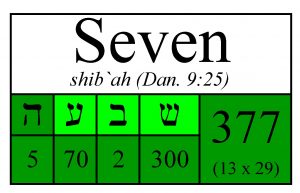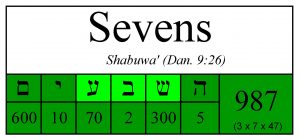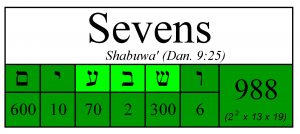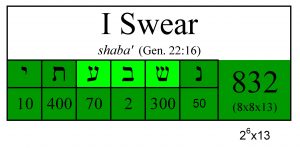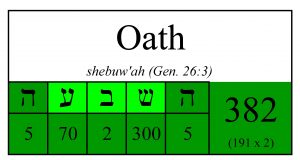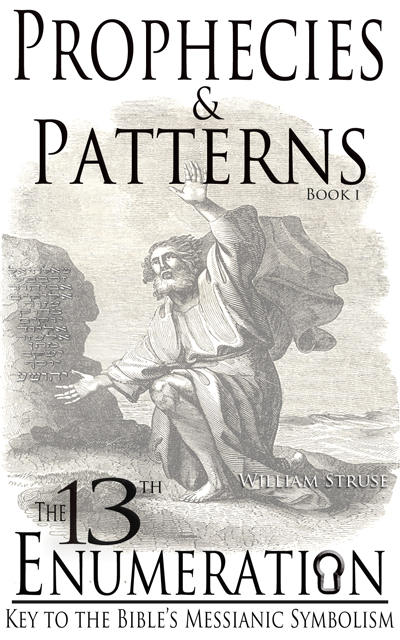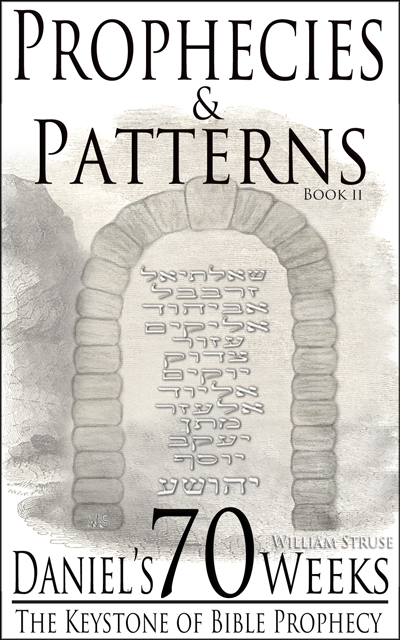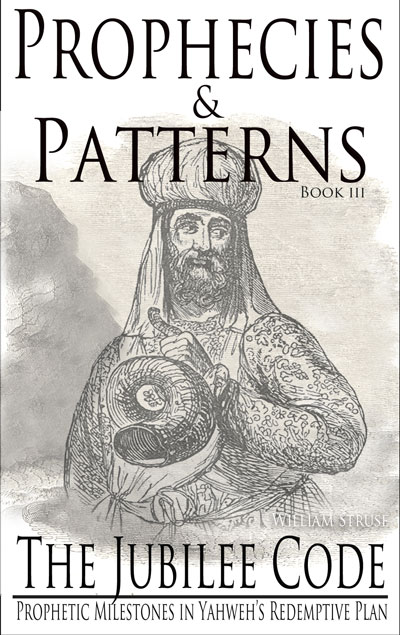Part I – I Have Sworn – An Oath of Sevens

We all know the thrilling story of Jesus’ (Yeshua’s) birth, of Mary and Joseph, of the angels sent to announce His birth, of the wise men bearing gifts, and even the merciless Romans and the brutal Herod. This week though, I want to share with you some Biblical history related to Christ’s birth that’s even more important than these wonderful traditions we are all so familiar with.
Today, I hope you’ll join me on a wonderful adventure as we explore the underlying Messianic message of the Bible as it relates to the coming of Christ. I’ll tell you right up front that it will take a bit of work to follow the momentous threads of this story, but I guarantee if you make the effort with me, you’ll have a new appreciation for the lengths to which Yahweh, the living God of the Bible, went to ensure that all of us would have the evidence necessary to believe that Yeshua (Jesus) was indeed His Salvation sent to redeem all of us from our sins.
To get you thinking a bit outside the box of your familiar traditions, let me ask you a question:
What was the real miracle of Yeshua’s first coming? Was it His birth, or His conception?
If we think about it carefully, it could be argued that the real miracle of Yeshua’s first coming was the unfathomable fact that YHWH, the living God of the Bible, made himself lower than the angels and took on human flesh so that He could redeem mankind from their sins. He, YHWH, when the righteous penalty for our sins was carried out, stood in our place and became our Yeshua. (Yeshua in Hebrew means – Yahweh’s Salvation) As wonderful as Yeshua’s birth was, it was simply the natural order of things following His miraculous conception 9 months earlier. To set off on the right foot, let’s look at a couple of passages which speak about Yeshua’s divine nature and His humble human incarnation.
In the beginning was the Word, and the Word was with God, and the Word was God. The same was in the beginning with God. All things were made by him; and without him was not any thing made that was made….
And the Word was made flesh, and dwelt among and dwelt [tabernacled] among us, (and we beheld his glory, the glory as of the only begotten of the Father,) full of grace and truth. (John 1:1-3 &14 )
But we see Jesus, who was made a little lower than the angels for the suffering of death, crowned with glory and honour; that he by the grace of God should taste death for every man. (Hebrews 2:9)
In this two part series we’ll explore the events leading up to the Messiah’s birth, events which were foretold with an amazing prophecy that lays out the roadmap for the coming of the Messiah and provides us with insights as to why YHWH, in His divine perfection (represented throughout the Bible by the number 7) lowered Himself and became human flesh (represented by the number 6).
Or as the apostle Matthew so beautifully and cleverly illustrates in the first chapter of the first book of the New Testament, Yeshua (through his legal father Joseph) came as the 13th enumeration, a literal Homo Deus or God Man (6+7=13).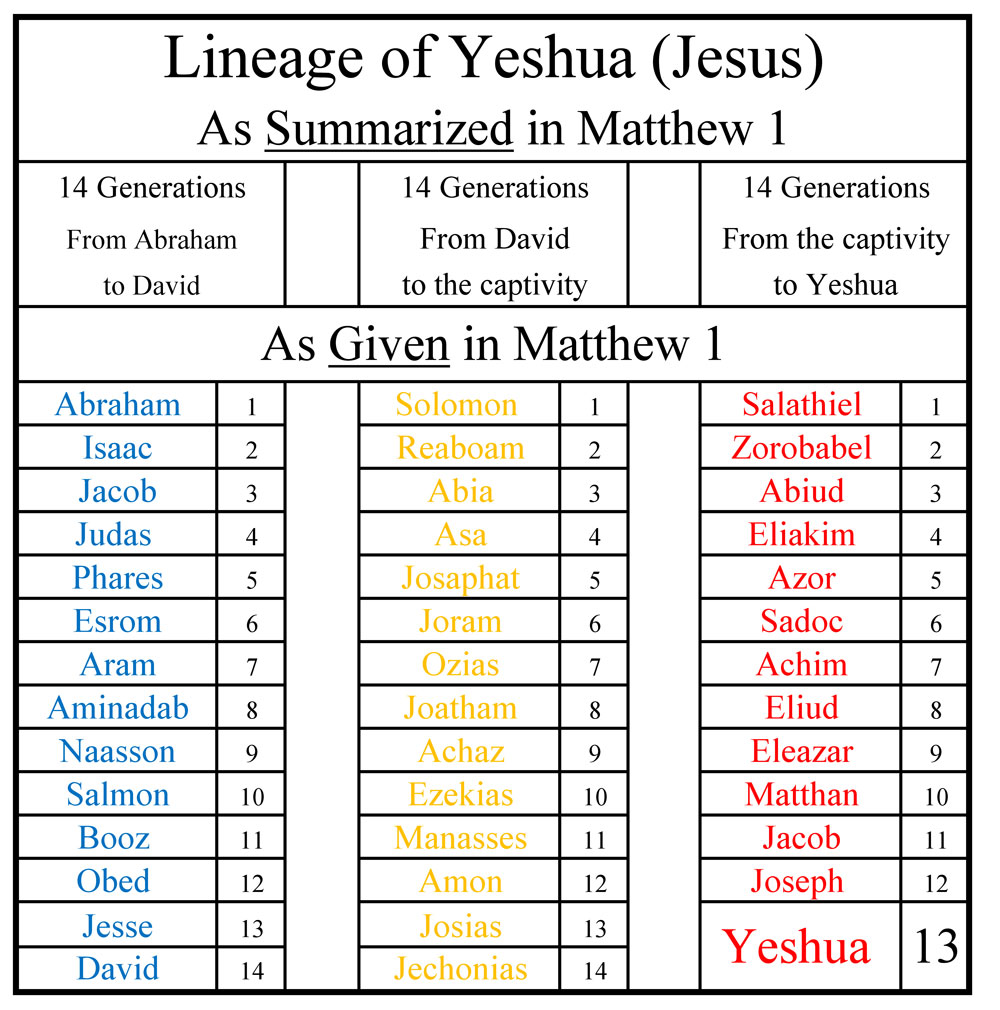
These events also provide us with enough Biblical history to understand the likely reason the Christian traditions of Christmas as the birthday of the Messiah superseded the more important and earlier date which marked the Messiah conception.
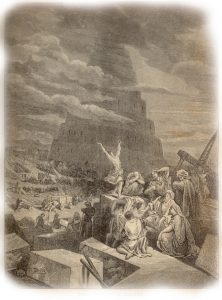 The Fall of Babylon and the Promised Redeemer
The Fall of Babylon and the Promised Redeemer
In fitting irony our story begins in Babylon of the Chaldeans, the rebuilt ancient metropolis where centuries before, mankind in their hubris and pride tried to make their own pathway to heaven. As is so often demonstrated in the Bible, man’s ways are not always in sync with God’s ways. In this case, Yahweh’s pathway for mankind to reach heaven didn’t begin with a tower but rather a humble manger.
So it’s in the first year of a conquered Babylon and its new Median king (Likely the viceroy of Cyrus the Great) that we find an ancient Jewish man on his knees, his face towards the distant homeland of his fathers, his body prostrate in prayer to the living God of the Bible, a man pleading for the restoration of Jerusalem and its desolate sanctuary, that once glorious, though temporary dwelling place of Yahweh, the living God of the Bible.
This prayer as it is recorded in the 9th chapter of the book of Daniel is truly one of the most moving prayers you’ll find in the Bible. It is so moving in fact, that it touched the heart of Yahweh and caused Him to respond with a thrilling message to Daniel. This message you and I know as the prophecy of 70 Sevens, more commonly known to some of you as the Prophecy of 70 Weeks.
The Coming of the Messiah
Did you know that 70 Sevens prophecy is the only prophecy in the Bible which gives a specific date by which we can determine the timing of the Messiah’s first coming? In other words, this is the only prophecy in the Bible that links verifiable secular dates with a predicted date for the arrival of the Messiah.
Of all the hundreds and hundreds of other Messianic prophecies in the Bible, this is the only one that provides verifiable, datable chronology proving that Yeshua of Nazareth was the Bible’s promised Messiah. As I explained in my recent article Sir Isaac Newton, Daniel 9, & the Rabbinic Forgeries Hypothesis, this prophecy was so influential that it was used by the followers of nearly every Jewish messianic hero of the 1st centuries BC & AD to prove that their hero was the Bible’s promised messiah. Unfortunately, they sought a warrior to restore Israel’s political fortunes when Yahweh’s plan included a humble carpenter (builder or craftsman) sent to first restore their spiritual fortunes.
An Answer To Prayer
Now you might be thinking, sure the Jewish messianic expectants of the first centuries BC/AD might have understood Daniel 9 to speak of the coming Messiah, but their messianic expectations were wrong. So how can we be any more confident that this prophecy speaks of Yeshua of Nazareth as the coming Messiah? Fair question, so let’s dig into that a bit.
First of all, keep in mind that Daniel 9 describes specific pleadings by Daniel and a specific answer by Yahweh, the living God of the Bible. We cannot separate the context of one from the other. With this in mind we find that the very first words out of Daniel’s mouth are incredibly significant.
And I prayed unto YHWH my God, and made my confession, and said, O Lord, the great and dreadful God, keeping the covenant and mercy to them that love him, and to them that keep his commandments;… ( Daniel 9:4)
The Covenant and Mercy
I can’t tell you how much Daniel 9:4 thrills me. The Bible is so congruent! Too often I think we look at the Bible as a bunch of books and stories, each with valuable insights and moral guidance but no single idea which binds them into a congruent whole. This couldn’t be farther from the truth.
The Bible is 66 books, each of which provide a piece of the panoramic picture of Yahweh’s redemptive plan for mankind. The Bible is the story of Yahweh’s Salvation for mankind. It is the story of His Yeshua! (To remind you, Yeshua (Jesus), in Hebrew means Yahweh’s Salvation or the Salvation of Yahweh). Here in Daniel 9:4 we find a major piece or thread if you will, of this redemptive panoramic.
It’s no accident that Daniel opens his pleadings on behalf of his people, his city, and Yahweh’s desolate sanctuary – with a call for Yahweh to remember the Covenant and Mercy “to them that love him, and that keep his commandments”.
You can read more about this Covenant and Mercy in my free book Daniel’s 70 Weeks: The Keystone of Bible Prophecy or my article Seven, 70, & Sevens: Daniel 9 & the Bible’s Messianic Symbolism but in short, Daniel’s remembrance of Yahweh’s Covenant and Mercy is a direct quote from Deut. 7:9-12 where Moses (just as Israel is poised to enter the Promised Land) is reminding Israel about the covenant Yahweh swore (shaba) with Abraham, Isaac, and Jacob. Here take a look:
Know therefore that YHWH thy God, he is God, the faithful God, which keepeth covenant and mercy with them that love him and keep his commandments to a thousand generations;…
Wherefore it shall come to pass, if ye hearken to these judgments, and keep, and do them, that YHWH thy God shall keep unto thee the covenant and the mercy which he sware [shaba] unto thy fathers: (Deuteronomy 7:9-12)
Here is where this so called Covenant and Mercy gets really exciting. You see, if you follow this thread of covenant and mercy back through the Biblical story you’ll find it originates with the father Abraham and an “oath” (shebuw’ah) Yahweh, the living God of the Bible, swore (shaba) with him. To give you an added sense of the importance of this oath, take note that this was the first “oath” Yahweh swore (shaba) with any man or woman in the Bible. This oath in part, promised that through Abraham’s “seed” all nations of the earth would be blessed. Here read the words for yourself:
And the angel of YHWH called unto Abraham out of heaven the second time, And said, By myself have I sworn [shaba], saith YHWH, for because thou hast done this thing, and hast not withheld thy son, thine only son:
That in blessing I will bless thee, and in multiplying I will multiply thy seed as the stars of the heaven, and as the sand which is upon the sea shore; and thy seed shall possess the gate of his enemies;
And in thy seed shall all the nations of the earth be blessed; because thou hast obeyed my voice.
So Abraham returned unto his young men, and they rose up and went together to Beersheba; and Abraham dwelt at Beersheba. (Genesis 22:15-19)
It was there on that holy mountain, when Abraham demonstrated his faith (by a willingness to sacrifice his only son in that ancient messianic foreshadowing) that Yahweh swore (shaba) that someday through Abraham’s “seed” all nations of the earth would be blessed. Indeed centuries later it was on that very same mountain, where Yeshua became mankind’s salvation.
To Sware Sevens
For those of you not familiar with Hebrew, some fascinating details about the word “sworn” or “to sware” (shaba) and its relationship to the numbers 7, Sevens, and 70 is worth noting here.
Shaba, the Hebrew word for sware, is phonetically identical to the Hebrew word for the number 7. In other words, before vowel pointings or cantillation marks were added during the middle ages, context determined the meaning of the word shaba. For those of you, like me, who need a visual, here are the Hebrew words for shaba and seven. See if you can find any difference: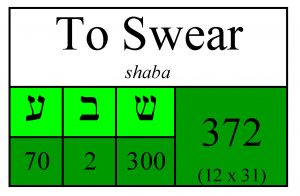
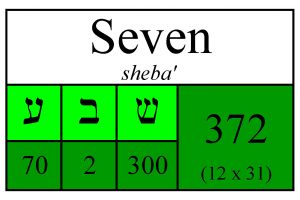
Interesting, isn’t it?
It is further worth noting that shaba (to sware / sworn) is also the root of the following Hebrew words and their variants. To aid in comparison I’ve provided the Hebrew letter value for each word. I’ve also highlighted the root “shaba” in every word.
Messianic Markers
The wonder of Yahweh’s redemptive plan and the ingeniousness of the way He incorporated evidence of that plan in the entire Bible should blow you away. Think of it this way, consider the Hebrew word shaba (Sware/Seven) as Messianic marker of divine perfection for Yahweh’s redemptive plan for mankind.
When Yahweh swore to Abraham that through his “seed” all nations of the earth would be blessed, this swearing henceforth became known as the Covenant and Mercy of Yahweh.
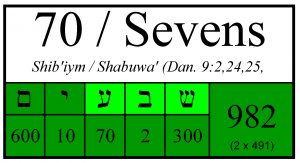 Realistically, you could call this swearing an “oath of sevens”. After all to sware and seven are the exact same word! Centuries after Yahweh’s covenant with Abraham, the prophet Daniel was pleading for Yahweh’s “covenant and mercy” in Daniel 9:4. Immediately Yahweh sent Daniel a prophecy which provided Daniel with an answer to when that “covenant and mercy” of the promised seed would come, in other words – when the Messiah would come. Yahweh’s reply was the prophecy you and I know as the 70 Sevens or more accurately in Hebrew as Shabuwa/Shib’iym.
Realistically, you could call this swearing an “oath of sevens”. After all to sware and seven are the exact same word! Centuries after Yahweh’s covenant with Abraham, the prophet Daniel was pleading for Yahweh’s “covenant and mercy” in Daniel 9:4. Immediately Yahweh sent Daniel a prophecy which provided Daniel with an answer to when that “covenant and mercy” of the promised seed would come, in other words – when the Messiah would come. Yahweh’s reply was the prophecy you and I know as the 70 Sevens or more accurately in Hebrew as Shabuwa/Shib’iym.
Do you see how awesome that is?
Yahweh’s answer to Daniel was a messianic prophecy rooted literally, spiritually, and Hebrew grammatically in the oath of “sevens” Yahweh swore with Abraham.
Yahweh’s oath of sevens with Abraham, centuries later was confirmed in a prophecy of 70 sevens, given to Daniel which precisely told Israel (and mankind) when that oath of sevens (the covenant and mercy) would become manifest.
I would call that divine ingenuity, wouldn’t you?
What more proof do you need that Daniel 9 is a prophecy which speaks of the Bible’s promised Messiah? Consider once more Yahweh’s words to Abraham and Isaac:
And said, By myself have I sworn [shaba], saith YHWH, for because thou hast done this thing, and hast not withheld thy son, thine only son: That in blessing I will bless thee, and in multiplying I will multiply thy seed as the stars of the heaven, and as the sand which is upon the sea shore; and thy seed shall possess the gate of his enemies;
And in thy seed shall all the nations of the earth be blessed; (Genesis 22:16-18)
And the YHWH appeared unto him [Isaac], and said,
I will perform the oath [shebuw’ah] which I sware [shaba] unto Abraham thy father; 4 And I will make thy seed to multiply as the stars of heaven, and will give unto thy seed all these countries; and in thy seed shall all the nations of the earth be blessed; (Genesis 26:2-4)
To round this aspect of the subject out here is the TWOT Bible Lexicon explaining the usage of the word “shaba”.
It is apparent that shaba “swear” is identical in its consonantal root to the word sheba “seven.” It is identical, of course, to the feminine form of seven-the masculine adding a fourth letter, “he”-and it is in the feminine in which the Hebrew counts his cardinal numbers! [another approach is to call shibâ the fem. from though it is used with masc. nouns, and sheba the masc. from used with fem. nouns. R.L.H.]
Not only is the Hebrew verb “to swear” identical in the ancient unpointed text to the number seven, but also a relationship is suggested by the 2000 B.C. incident of Gen 21:22-34 . Here Abimelech desires Abraham to swear to deal uprightly, while Abraham in turn requires Abimelech to swear that the well of water belongs to him, Abraham. Abraham then seals the oath by giving exactly seven ewe lambs as a testimonial witness to Abimelech, and the well is called Beer-sheba, or Well-of-the-seven-oath! Thus BDB has defined shaba by the pithy oneline paraphrase, “to… seven one self, or bind oneself by seven things” (p. 989). Gesenius cites Herodotus iii:8 and the Iliad, xix:243, to give evidence that in the ancient world it was not uncommon to seal an agreement by the septenary number….
An oath, shebûwâ, should be contrasted to a covenant, berît, in order to better understand both. An oath in the OT is a solemn verbal statement or pledge that is affirmed, while the covenant is the substance of an agreement itself. In the Hebrew idiom, one would swear (shaba) an oath (shebûwâ), e.g. Gen 26:3, “I [God] will perform an oath which I swore unto Abraham.” A covenant, however, would be either established (Hiphil of qûm, literally, “caused to stand”) as in Gen 17:19, or it would be cut (k¹rat) as in Jer 31:31, “I [God] will make (cut) a new covenant with the House of Israel.”
Oaths were made by Jehovah to show the absolute certainty of his performance of that which he promised (e.g. to Abraham, Gen 26:3; and Isaac, Psa 105:9). (excerpted from 2319a in the TWOT Bible Lexicon)
Wonderfully congruent, isn’t it?
But now let’s turn our attention to how the New Testament writers understood the Covenant and Mercy, that ancient oath of sevens made by Yahweh with Abraham.
[DISPLAY_ULTIMATE_PLUS]
The Covenant and Mercy in the New Testament
Did you know that Paul, Zachariah (father of John), Peter, and even Mary the Mother of Yeshua all alluded to the Covenant and Mercy of Genesis 22, Deut. 7, and Daniel 9 as a promise fulfilled in Yeshua? Here read it for yourself:
And the scripture, foreseeing that God would justify the heathen through faith, preached before the gospel unto Abraham, saying, In thee shall all nations be blessed….
Now to Abraham and his seed were the promises made. He saith not, And to seeds, as of many; but as of one, And to thy seed, which is Christ. And this I say, that the covenant, that was confirmed before of God in Christ, the law, which was four hundred and thirty years after, cannot disannul, that it should make the promise of none effect. (Galatians 3:8, 16-17)
Did you catch that? Paul acknowledges that Yahweh’s covenant (oath) with Abraham that his “seed” would be a blessing to all the nations, was a Messianic covenant “confirmed” and fulfilled in Yeshua.
Zachariah and the Covenant
Zachariah, the father of John, even acknowledged that covenant and mercy that Yahweh “sware” to Abraham would be fulfilled through a “horn of Salvation” in the house of David. This “horn of salvation” which Zachariah acknowledged was spoken about by “his holy prophets, which have been since the world began”.
Blessed be the Lord God of Israel; for he hath visited and redeemed his people, And hath raised up an horn of salvation for us in the house of his servant David;
As he spake by the mouth of his holy prophets, which have been since the world began: That we should be saved from our enemies, and from the hand of all that hate us;
To perform the mercy promised to our fathers, and to remember his holy covenant; The oath [shebew’ah] which he sware [shaba] to our father Abraham,.. (Luke 1:68-73)
Mary and the Covenant
It was just a few months previous to this statement by Zachariah, that Mary the Mother of Yeshua, when visiting Zachariah and his wife Elisabeth acknowledged the following in response to Elisabeth salutation that she (Mary) was “blessed among women”.
And it came to pass, that, when Elisabeth heard the salutation of Mary, the babe leaped in her womb; and Elisabeth was filled with the Holy Ghost: And she spake out with a loud voice, and said, Blessed art thou among women, and blessed is the fruit of thy womb. And whence is this to me, that the mother of my Lord should come to me?
And Mary said, My soul doth magnify the Lord, And my spirit hath rejoiced in God my Saviour. For he hath regarded the low estate of his handmaiden: for, behold, from henceforth all generations shall call me blessed. For he that is mighty hath done to me great things; and holy is his name. And his mercy is on them that fear him from generation to generation.
He hath holpen his servant Israel, in remembrance of his mercy; As he spake to our fathers, to Abraham, and to his seed for ever. (Luke 1:41-43, 46-49, 54-55 )
Peter and the Covenant
Just to leave no doubt in your minds as to the meaning of this Covenant and Mercy as understood by the New Testament apostles, here are the words of Peter in Acts 3 when speaking to his brethern on the temple mount in Jerusalem as they marveled about the Peter’s healing of the lame man:
And when Peter saw it, he answered unto the people, Ye men of Israel, why marvel ye at this? or why look ye so earnestly on us, as though by our own power or holiness we had made this man to walk? 13 The God of Abraham, and of Isaac, and of Jacob, the God of our fathers, hath glorified his Son Jesus… And his name through faith in his name hath made this man strong,…
But those things, which God before had shewed by the mouth of all his prophets, that Christ should suffer, he hath so fulfilled. Repent ye therefore, and be converted, that your sins may be blotted out, when the times of refreshing shall come from the presence of the Lord; And he shall send Jesus Christ, which before was preached unto you:…
Yea, and all the prophets from Samuel and those that follow after, as many as have spoken, have likewise foretold of these days.
Ye are the children of the prophets, and of the covenant which God made with our fathers, saying unto Abraham, And in thy seed shall all the kindreds of the earth be blessed. Unto you first God, having raised up his Son Jesus, sent him to bless you, in turning away every one of you from his iniquities. (Acts 3:12-26 excerpted)
Wow, powerful words, are they not? Here Peter is telling his Jewish brethren in the temple that Yeshua was a fulfillment of what Yahweh had promised by the “mouth of all his prophets”. Further that Yeshua’s death and resurrection was the fulfillment of the “covenant” Yahweh made with Abraham which promised that in his “seed” all nations of the earth would be blessed, a blessing which at its heart entailed a spiritual restoration of the people by their “turning away” from their iniquities.
As we move on to the next messianic thread in Yahweh’s redemptive plan for mankind, keep the above words of Peter in mind. As you see, they are an important reminder of another ancient prophecy (we’ll look at in the next part of this series) which spoke of a promised blessing upon the Jewish people (and by extension the Gentiles as well).
…Unto you first God, having raised up his Son Jesus, sent him to bless you, in turning away every one of you from his iniquities. (Acts 3:26)
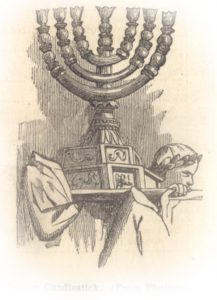 Yahweh willing, In Part II – I am the Light of the World, I will show you how Yahweh’s – oath of sevens- with Abraham, (as described in the prophecy of 70 sevens) was fulfilled in Yeshua. We will also look at how that prophecy and its fulfillment became the basis for Yeshua’s statement that He was the “light of the world” and further I will provide you with reasonable evidence to show how that light dawned upon mankind in the winter of 5 BC during the Jewish Festival of Lights, also known as Hanukkah. Finally, I will do my best to explain why this history is likely the origin of early Roman Catholic traditions related to Christmas.
Yahweh willing, In Part II – I am the Light of the World, I will show you how Yahweh’s – oath of sevens- with Abraham, (as described in the prophecy of 70 sevens) was fulfilled in Yeshua. We will also look at how that prophecy and its fulfillment became the basis for Yeshua’s statement that He was the “light of the world” and further I will provide you with reasonable evidence to show how that light dawned upon mankind in the winter of 5 BC during the Jewish Festival of Lights, also known as Hanukkah. Finally, I will do my best to explain why this history is likely the origin of early Roman Catholic traditions related to Christmas.
Updated: You can read part two here: I am the Light of the World
Maranatha!

